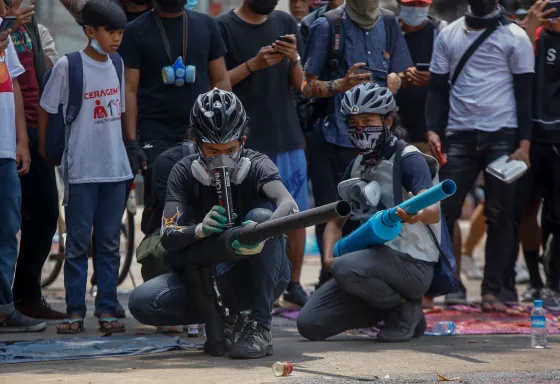YANGON, Myanmar — Protesters in Myanmar fired slingshots and threw Molotov cocktails toward lines of security forces after apparently coming under fire Wednesday in a rare incidence of anti-coup demonstrators fighting back against a relentlessly violent crackdown.
The growing resistance comes after one organization said that more than 200 people have been killed since the Feb. 1 takeover.
At least two people were shot dead during protests Wednesday in Kalay in northwestern Myanmar, according to press and social media posts that included photos of the victims.
Smoke and fires were seen in Kalay and Yangon Wednesday night, reportedly from the authorities burning down barricades protesters had set up during the day.
Protests against the coup that ousted the elected government of Aung San Suu Kyi have shown remarkable staying power and largely remained peaceful, despite curbs on internet access, the imposition of martial law in some places, and an extraordinarily violent response by police.
Demonstrators have come up with innovative ways to carry on in the face of the violence, including lining up placards as stand-ins for themselves or coconuts painted with the words “Spring Revolution.”
But on Wednesday, after security forces apparently shot at them in the country’s largest city of Yangon, demonstrators initially fled — but then crept back to hunker down behind sandbag barricades. Some hurled firebombs, while others took aim with slingshots — though the forces were too far away to be hit.
Pope Francis appealed for an end to the bloodshed on Wednesday.
In an apparent reference to widely broadcast images of a nun in Myanmar, kneeling in the street in front of armed security forces begging them not to shoot protesters, Francis said: “I, too, kneel on the streets of Myanmar and say: may violence cease.”
Protesters last week in response to increased police violence began taking a more aggressive approach to self-defense — burning tires at barricades and pushing back when they could against attacks.
A statement issued Sunday by the Committee Representing Pyihtaungsu Hluttaw — an organization of the elected members of Parliament whom the military barred from taking their seats but who have set themselves up as an alternative government to the junta — announced that the general public has the legal right to self-defense against the security forces. The committee was earlier called a treasonous organization by the junta, which declared it illegal.
State television MRTV announced Tuesday evening that the committee’s appointee as a special envoy to the U.N. has been charged with high treason, which carries a death sentence.
Dr. Sasa, who uses a single name, is in hiding but has frequently been in contact with journalists, diplomats and others through videoconferencing.

The coup reversed years of slow progress toward democracy in Myanmar, which languished for five decades under strict military rule that led to international isolation and sanctions.
The independent Assistance Association for Political Prisoners, which keeps a tally of deaths related to the crackdown, said that as of Tuesday 202 people had been killed, and 2,181 arrested or charged.
“Junta forces target protesters but also ordinary people using sniper rifles regardless of the time or place,” according to association.
“Some injured people were arrested and died without access to medical treatment, some individuals have died due to being tortured during interrogation, some others who were shot dead in a crackdown were dragged away without mercy and their dead bodies are not being returned to their families by junta forces,” the association said, repeating widespread and credible allegations.
The junta has denied any abusive actions, but concedes protesters have been shot when taking part in what it has described as rioting. Its death toll is much lower than others.
The head of The Independent Investigative Mechanism for Myanmar, created by the U.N. Human Rights Council to collect evidence of the most serious international crimes and violations of international law committed in the country, urged recipients of illegal orders to make contact when its safe.
Nicholas Koumjian said those most responsible for these crimes “are usually those in high leadership positions,” not the perpetrators. To prove responsibility, he explained, requires evidence of reports, orders and how policies were set.
“This is normally not evidence that can be provided by the victims, but rather requires that those who received or were aware of illegal orders or policies reveal the truth,” Koumjian said. When safe, messages should be sent to mountain741@protonmail.com
In addition to the violence, the junta also initially detained hundreds of senior politicians and has kept Suu Kyi, who was the country’s de facto leader before the takeover, in custody and charged her with several crimes that her supporters say are politically motivated.
Regional media outlets and social media posts reported new peaceful protest marches Wednesday in cities and towns including Taungoo, Thayet, Myingyan, and Madaya, all in central Myanmar; Tamu, in the northwest near the border with India, and Pyay, on the Irrawaddy River northwest of Yangon.
The government ordered mobile internet data service shut on Sunday. Wi-Fi access, which is much less extensive, has been left on. But some users reported Wednesday that it has slowed to a crawl, making it difficult to upload photos and video.
Several neighborhoods in Yangon have been under martial law since Monday, putting them under complete control by the military, which has also made it difficult for protesters to organize and communicate.
from TIME



0 Comments
Give your valuable feedback !